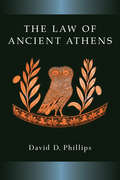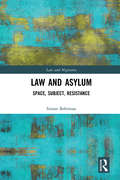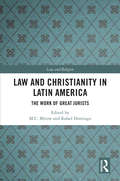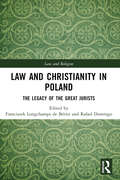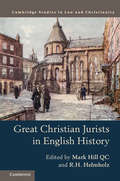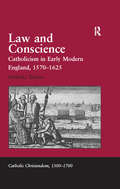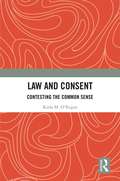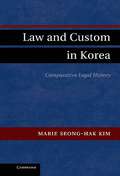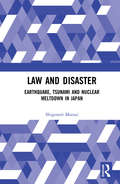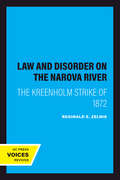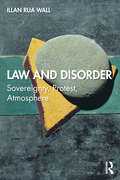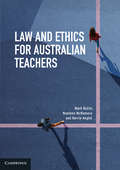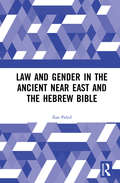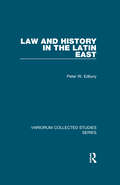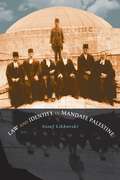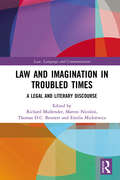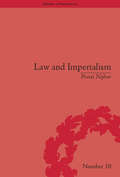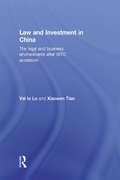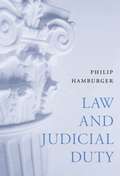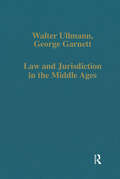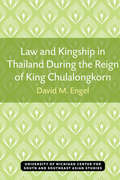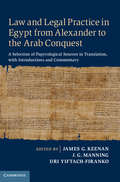- Table View
- List View
Law And Society In The Ancient World: Law Of Ancient Athens
by David PhillipsThe Law of Ancient Athens contains the principal literary and epigraphical sources, in English, for Athenian law in the Archaic and Classical periods, from the first known historical trial (late seventh century) to the fall of the democracy in 322 BCE. This accessible and important volume is designed for teachers, students, and general readers interested in the ancient Greek world, the history of law, and the history of democracy, an Athenian invention during this period. Offering a comprehensive treatment of Athenian law, it assumes no prior knowledge of the subject and is organized in user-friendly fashion, progressing from the person to the family to property and obligations to the gods and to the state. David D. Phillips has translated all sources into English, and he has added significant introductory and explanatory material. Topics covered in the book include homicide and wounding; theft; marriage, children, and inheritance; citizenship; contracts and commerce; impiety; treason and other offenses against the state; and sexual offenses including rape and prostitution. The volume’s unique feature is its presentation of the actual primary sources for Athenian laws, with many key or disputed terms rendered in transliterated Greek. The translated sources, together with the topical introductions, notes, and references, will facilitate both research in the field and the teaching of increasingly popular courses on Athenian law and law in the ancient world.
Law and Asylum: Space, Subject, Resistance (Law and Migration)
by Simon BehrmanIn contrast to the claim that refugee law has been a key in guaranteeing a space of protection for refugees, this book argues that law has been instrumental in eliminating spaces of protection, not just from one’s persecutors but also from the grasp of sovereign power. By uncovering certain fundamental aspects of asylum as practised in the past and in present day social movements, namely its concern with defining space rather than people and its role as a space of resistance or otherness to sovereign law, this book demonstrates that asylum has historically been antagonistic to law and vice versa. In contrast, twentieth-century refugee law was constructed precisely to ensure the effective management and control over the movements of forced migrants. To illustrate the complex ways in which these two paradigms – asylum and refugee law – interact with one another, this book examines their historical development and concludes with in-depth studies of the Sanctuary Movement in the United States and the Sans-Papiers of France. The book will appeal to researchers and students of refugee law and refugee studies; legal and political philosophy; ancient, medieval and modern legal history; and sociology of political movements.
Law and Authority in British Legal History, 1200–1900
by Mark GodfreyBy presenting original research into British legal history, this volume emphasises the historical shaping of the law by ideas of authority. The essays offer perspectives upon the way that ideas of authority underpinned the conceptualisation and interpretation of legal sources over time and became embedded in legal institutions. The contributors explore the basis of the authority of particular sources of law, such as legislation or court judgments, and highlight how this was affected by shifting ideas relating to concepts of sovereignty, religion, political legitimacy, the nature of law, equity and judicial interpretation. The analysis also encompasses ideas of authority which influenced the development of courts, remedies and jurisdictions, international aspects of legal authority when questions of foreign law or jurisdiction arose in British courts, the wider authority of systems of legal ideas such as natural law, the authority of legal treatises, and the relationship between history, law and legal thought.
Law and Authority in the Early Middle Ages
by Thomas FaulknerThe barbarian law codes, compiled between the sixth and eighth centuries, were copied remarkably frequently in the Carolingian ninth century. They provide crucial evidence for early medieval society, including the settlement of disputes, the nature of political authority, literacy, and the construction of ethnic identities. Yet it has proved extremely difficult to establish why the codes were copied in the ninth century, how they were read, and how their rich evidence should be used. Thomas Faulkner tackles these questions more systematically than ever before, proposing new understandings of the relationship between the making of law and royal power, and the reading of law and the maintenance of ethnic identities. Faulkner suggests major reinterpretations of central texts, including the Carolingian law codes, the capitularies adding to the laws, and Carolingian revisions of earlier barbarian and Roman laws. He also provides detailed analysis of legal manuscripts, especially those associated with the leges-scriptorium.
Law and Christianity in Latin America: The Work of Great Jurists (Law and Religion)
by M.C. Mirow and Rafael DomingoThis volume examines the lives of more than thirty-five key personalities in Latin American law with a focus on how their Christian faith was a factor in molding the evolution of law in their countries and the region. The book is a significant contribution to our ability to understand the work and perspectives of jurists and their effect on legal development in Latin America. The individuals selected for study exhibit wide-ranging areas of expertise from private law and codification, through national public law and constitutional law, to international developments that left their mark on the region and the world. The chapters discuss the jurists within their historical, intellectual, and political context. The editors selected jurists after extensive consultation with legal historians in various countries of the region looking at the jurist’s particular merits, contributions to law in general, religious perspective, and importance within the specific country and period under consideration. Giving the work a diversity of international and methodological perspectives, the chapters have been written by distinguished legal scholars and historians from Latin America and around the world. The collection will appeal to scholars, lawyers, and students interested in the interplay between law and religion. Political, social, legal, and religious historians among other readers will find, for the first time in English, authoritative treatments of the region’s essential legal thinkers and authors. Students and other who may not read Spanish will appreciate these clear, accessible, and engaging English studies of the region’s great jurists.
Law and Christianity in Poland: The Legacy of the Great Jurists (Law and Religion)
by Rafael Domingo Franciszek Longchamps de BérierThis volume is the first comprehensive study of the Polish history of law and Christianity written in English for a global audience. It examines the lives of twenty-one central figures in Polish law with a focus on how their Christian faith was a factor in molding the evolution of law in their country and the region. The individuals selected for study exhibit wide-ranging areas of expertise, from private law and codification, through national public law and constitutional law, to international developments that left their mark on Poland and the world. The chapters discuss the jurists within their historical, intellectual, and political context. The editors selected jurists after extensive consultation with legal historians looking at the jurists’ particular merits, contributions to law in general, religious perspective, and period under consideration. The collection will appeal to scholars, lawyers, and students interested in the interplay between law and religion. Political, social, legal, and religious historians, among other readers, will find, for the first time in English, authoritative treatments of essential Polish legal thinkers and authors.
Law and Christianity: Great Christian Jurists in English History (Law and Christianity)
by Mark Hill Helmholz R. h.The Great Christian Jurists series comprises a library of national volumes of detailed biographies of leading jurists, judges and practitioners, assessing the impact of their Christian faith on the professional output of the individuals studied. Little has previously been written about the faith of the great judges who framed and developed the English common law over centuries, but this unique volume explores how their beliefs were reflected in their judicial functions. This comparative study, embracing ten centuries of English law, draws some remarkable conclusions as to how Christianity shaped the views of lawyers and judges. Adopting a long historical perspective, this volume also explores the lives of judges whose practice in or conception of law helped to shape the Church, its law or the articulation of its doctrine.
Law and Conscience: Catholicism in Early Modern England, 1570–1625 (Catholic Christendom, 1300-1700)
by Stefania TutinoThis book examines the Catholic elaboration on the relationship between state and Church in late Elizabethan and Jacobean England. Among the several factors which have contributed to the complex process of state-formation in early modern Europe, religious affiliation has certainly been one of the most important, if not the most important. Within the European context of the consolidation of both the nation-state entities and the state-Churches, Catholicism in England in the 16th and 17th centuries presents peculiar elements which are crucial to understanding the problems at stake, from both a political and a religious point of view. Catholics in early modern England were certainly a minority, but a minority of an interestingly doubled kind. On the one hand, they were a "sect" among many others. On the other hand, Catholicism was a "universal", catholic religion, in a country in which the sovereign was the head - or governor - of both political and ecclesiastical establishments. In this context, this monograph casts light on the mechanisms through which a distinctive religious minority was able to adapt itself within a singular political context. In the most general terms, this book contributes to the significant question of how different religious affiliations could (or might) be integrated within one national reality, and how political allegiance and religious belief began to be perceived as two different identities within one context. Current scholarship on the religious history of early modern England has considerably changed the way in which historians think about English Protestantism. Recent works have offered a more nuanced and accurate picture of the English Protestant Church, which is now seen not as a monolithic institution, but rather as complex and fluid. This book seeks to offer certain elements of a complementary view of the English Catholic Church as an organism within which the debate over how to combine the catholic feature of the Church of Ro
Law and Consent: Contesting the Common Sense
by Karla M. O'ReganConsent is used in many different social and legal contexts with the pervasive understanding that it is, and has always been, about autonomy – but has it? Beginning with an overview of consent’s role in law today, this book investigates the doctrine’s inseparable association with personal autonomy and its effect in producing both idealised and demonised forms of personhood and agency. This prompts a search for alternative understandings of consent. Through an exploration of sexual offences in Antiquity, medical practice in the Middle Ages, and the regulation of bodily harm on the present-day sports field, this book demonstrates that, in contrast to its common sense story of autonomy, consent more often operates as an act of submission than as a form of personal freedom or agency. The book explores the implications of this counter-narrative for the law’s contemporary uses of consent, arguing that the kind of freedom consent is meant to enact might be foreclosed by the very frame in which we think about autonomy itself. This book will be of interest to scholars of many aspects of law, history, and feminism as well as students of criminal law, bioethics, and political theory.
Law and Custom in Korea
by Marie Seong-Hak KimThis book sets forth the evolution of Korea's law and legal system from the Chosǒn dynasty through the colonial and postcolonial modern periods. This is the first book in English that comprehensively studies Korean legal history in comparison with European legal history, with particular emphasis on customary law. Korea's passage to Romano-German civil law under Japanese rule marked a drastic departure from its indigenous legal tradition. The transplantation of modern civil law in Korea was facilitated by Japanese colonial jurists who themselves created a Korean customary law; this constructed customary law served as an intermediary regime between tradition and the demands of modern law. The transformation of Korean law by the brisk forces of Westernization points to new interpretations of colonial history and it presents an intriguing case for investigating the spread of law on the global level. In-depth discussions of French customary law and Japanese legal history in this book provide a solid conceptual framework suitable for comparing European and East Asian legal traditions.
Law and Disaster: Earthquake, Tsunami and Nuclear Meltdown in Japan
by Shigenori MatsuiOn the 11th of March 2011, an earthquake registering 9.0 on the Richter scale (the most powerful to ever strike Japan) hit the Tohoku region in northern Japan. The earthquake produced a devastating tsunami that wiped out coastal cities and towns, leaving 18,561 people dead or registered as missing. Due to the disaster, the capability of the Fukushima Nuclear Power Plant, operated by Tokyo Electric Power Company (TEPCO), was compromised, causing nuclear meltdown. The hydrogen blast destroyed the facilities, resulting in a spread of radioactive materials, and, subsequently, serious nuclear contamination. This combined event – earthquake, tsunami, and nuclear meltdown – became known as the Great East Japan Earthquake Disaster. This book examines the response of the Japanese government to the disaster, and its attempts to answer the legal questions posed by the combination of earthquake, tsunami, and nuclear meltdown. Japanese law, policy, and infrastructure were insufficiently prepared for these disasters, and the country’s weaknesses were brutally exposed. This book analyses these failings, and discusses what Japan, and other countries, can learn from these events.
Law and Disorder on the Narova River: The Kreenholm Strike of 1872
by Reginald E. ZelnikReginald Zelnik uses a single episode—a militant strike at the Kreenholm factory, Europe's largest textile plant—to explore the broad historical moment. In examining this crucial event of Russian history he sheds fresh light on local power relations, high politics in St. Petersburg, controversies over the rule of law, and the origins of the Russian labor movement. Zelnik sees this pivotal moment in Russian labor history as the beginning step in the series of conflicts that eventually led to the upheavals of the early twentieth century.
Law and Disorder: Sovereignty, Protest, Atmosphere
by Illan rua WallFocusing on the moment when social unrest takes hold of a populace, Law and Disorder offers a new account of sovereignty with an affective theory of public order and protest. In a state of unrest, the affective architecture of the sovereign order begins to crumble. The everyday peace and calm of public space is shattered as sovereign peace is challenged. In response, the state unleashes the full force of its exceptionality, and the violence of public order policing is deployed to restore the affects and atmospheres of habitual social relations. This book is a work of contemporary critical legal theory. It develops an affective theory of sovereign orders by focusing on the government of affective life and popular encounters with sovereignty. The chapters explore public order as a key articulation between sovereignty and government. In particular, policing of public order is exposed as a contemporary mode of exceptionality cast in the fires of colonial subjection. The state of unrest helps us see the ordinary affects of the sovereign order, but it also points to crowds as the essential component in the production of unrest. The atmospheres produced by crowds seep out from the squares and parks of occupation, settling on cities and states. In these new atmospheres, new possibilities of political and social organisation begin to appear. In short, crowds create the affective condition in which the settlement at the heart of the sovereign order can be revisited. This text thus develops a theory of sovereignty which places protest at its heart, and a theory of protest which starts from the affective valence of crowds. This book’s examination of the relationship between sovereignty and protest is of considerable interest to readers in law, politics and cultural studies, as well as to more general readers interested in contemporary forms of political resistance.
Law and Ethics for Australian Teachers
by Mark Butlin Noeleen McNamara Kerrie AnglinGetting to grips with law and policy can be daunting for beginning and established teachers alike. Law and Ethics for Australian Teachers provides an overview of the professional, legal and ethical issues teachers may encounter in the classroom and the broader school environment. This book breaks down the relevant case law, as well as state and territory legislation and policy, in an accessible way to help readers navigate these complex issues. It covers topics including duty of care and mandatory reporting, work health and safety issues, family court orders and parenting plans, suspensions and exclusions, and criminal law issues. Each chapter features case studies, definitions of key terms, detailed scenarios and end-of-chapter questions to help readers understand a wide range of professional issues. Written by a team of authors with both teaching and legal expertise, Law and Ethics for Australian Teachers is an essential resource for pre- and in-service teachers.
Law and Gender in the Ancient Near East and the Hebrew Bible
by Ilan PeledThis volume examines how gender relations were regulated in ancient Near Eastern and biblical law. The textual corpus examined includes the various pertinent law collections, royal decrees and instructions from Mesopotamia and Hatti, and the three biblical legal collections. Peled explores issues beginning with the wide societal perspective of gender equality and inequality, continues to the institutional perspective of economy, palace and temple, the family, and lastly, sex crimes. All the texts mentioned or referred to in the book are given in an appendix, both in the original languages and in English translation, allowing scholars to access the primary sources for themselves. Law and Gender in the Ancient Near East and the Hebrew Bible offers an invaluable resource for anyone working on Near Eastern society and culture, and gender in the ancient world more broadly.
Law and History in Cervantes' Don Quixote
by Susan ByrneLaw and History in Cervantes' Don Quixote is a deep consideration of the intellectual environment that gave rise to Cervantes' seminal work. Susan Byrne demonstrates how Cervantes synthesized the debates surrounding the two most authoritative discourses of his era - those of law and history - into a new aesthetic product, the modern novel.Byrne uncovers the empirical underpinnings of Don Quixote through a close philological study of Cervantes' sly questioning of and commentary on these fields. As she skilfully demonstrates, while sixteenth-century historiographers and jurists across southern Europe sought the philosophical nexus of their fields, Cervantes created one through the adventures of a protagonist whose history is all about justice. As such, Law and History in Cervantes' Don Quixote illustrates how Cervantes' art highlighted the inconsistencies of juridical-historical texts and practice, as well as anticipated the ultimate resolution of their paradoxes.
Law and History in the Latin East (Variorum Collected Studies #1048)
by Peter W. EdburyThis second collection of papers by Peter Edbury focuses primarily on the literature either composed in the Latin East or closely associated with it. The legal treatises from the kingdom of Jerusalem and from Cyprus and Antioch have long been recognized as providing insights into the juridical and social history of these places in the twelfth and thirteenth centuries, and some of the papers re-issued here reflect the author's work in re-editing two of the most famous of these treaties, those by John of Ibelin-Jaffa and Philip of Novara. The studies on historical literature are chiefly concerned with vernacular texts, most notably the Old French translation of William of Tyre and its Continuations, again much a result of his current work on a new edition of the Continuations and the associated text known as La Chronique d'Ernoul. Other papers concerned with aspects of the narrative traditions that furnish a significant part of our knowledge of Lusignan Cyprus in the thirteenth and fourteenth centuries, and with which in one way or another Peter Edbury has been engaged since the early 1970s.
Law and Identity in Mandate Palestine
by Assaf LikhovskiOne of the major questions facing the world today is the role of law in shaping identity and in balancing tradition with modernity. In an arid corner of the Mediterranean region in the first decades of the twentieth century, Mandate Palestine was confronting these very issues. Assaf Likhovski examines the legal history of Palestine, showing how law and identity interacted in a complex colonial society in which British rulers and Jewish and Arab subjects lived together. Law in Mandate Palestine was not merely an instrument of power or a method of solving individual disputes, says Likhovski. It was also a way of answering the question, "Who are we?" British officials, Jewish lawyers, and Arab scholars all turned to the law in their search for their identities, and all used it to create and disseminate a hybrid culture in which Western and non-Western norms existed simultaneously. Uncovering a rich arsenal of legal distinctions, notions, and doctrines used by lawyers to mediate between different identities, Likhovski provides a comprehensive account of the relationship between law and identity. His analysis suggests a new approach to both the legal history of Mandate Palestine and colonial societies in general.
Law and Imagination in Troubled Times: A Legal and Literary Discourse (Law, Language and Communication)
by Richard MullenderThis collection focuses on how troubled times impact upon the law, the body politic, and the complex interrelationship among them. It centres on how they engage in a dialogue with the imagination and literature, thus triggering an emergent (but thus far underdeveloped) field concerning the ‘legal imagination.’ Legal change necessitates a close examination of the historical, cultural, social, and economic variables that promote and affect such change. This requires us to attend to the variety of non-legal variables that percolate throughout the legal system. The collection probes ‘the transatlantic constitution’ and focuses attention on imagination in a common law context that seems to foster imagination as a cultural capability. The book is divided into four parts. The first part begins with a set of insights into the historical development of legal education in England and concludes with a reflection on the historical transition of England from an absolute monarchy to a republic. The second part of the volume examines the role that imagination plays in the functioning of the courts. The third part focuses on patterns of thought in legal scholarship and detects how legal imagination contributes to the process of producing new legal categories and terminology. The fourth part focuses on patterns of thought in legal scholarship, and looks to the impact of the imagination on legal thinking in the future. The work provides stimulating reading for those working in the areas of legal philosophy, legal history and law and humanities and law and language.
Law and Imperialism: Criminality and Constitution in Colonial India and Victorian England (Empires in Perspective #10)
by Preeti NijharLaws that were imposed by colonizers were as much an attempt to confirm their own identity as to control the more dangerous elements of a potentially unruly populace. This title uses material from both British Parliamentary Papers and colonial archive material to provide evidence of legal change and response.
Law and Investment in China: The Legal and Business Environment after China's WTO Accession
by Xiaowen Tian Vai Io LoThe Chinese market is appealing, but the Chinese legal system is very complicated. A basic understanding of Chinese law is absolutely crucial for companies investing in this fast-growing and potentially huge market. Since China is moving toward a socialist market economy and is increasingly integrated into the world market, some aspects of China's commercial law are different from, while others are moving into line with, those of mature market economies. This book provides an introduction to the Chinese legal system, focusing on laws and regulations on foreign direct investment and highlights recent government policies and measures undertaken to intensify economics reforms so as to meet various challenges arising from China's accession to the World Trade Organization.
Law and Judicial Duty
by Philip HamburgerPhilip Hamburger’s Law and Judicial Duty traces the early history of what is today called “judicial review.” Working from previously unexplored evidence, Hamburger questions the very concept of judicial review. Although decisions holding statutes unconstitutional are these days considered instances of a distinct judicial power of review, Hamburger shows that they were once understood merely as instances of a broader judicial duty. The book’s focus on judicial duty overturns the familiar debate about judicial power. The book is therefore essential reading for anyone concerned about the proper role of the judiciary. Hamburger lays the foundation for his argument by explaining the common law ideals of law and judicial duty. He shows that the law of the land was understood to rest on the authority of the lawmaker and that what could not be discerned within the law of the land was not considered legally binding. He then shows that judges had a duty to decide in accord with the law of the land. These two ideals—law and judicial duty—together established and limited what judges could do. By reviving an understanding of these common law ideals, Law and Judicial Duty calls into question the modern assumption that judicial review is a power within the judges’ control. Indeed, the book shows that what is currently considered a distinct power of review was once understood as a matter of duty—the duty of judges to decide in accord with the law of the land. The book thereby challenges the very notion of judicial review. It shows that judges had authority to hold government acts unconstitutional, but that they enjoyed this power only to the extent it was required by their duty. In laying out the common law ideals, and in explaining judicial review as an aspect of judicial duty, Law and Judicial Duty reveals a very different paradigm of law and of judging than prevails today. The book, moreover, sheds new light on a host of misunderstood problems, including intent, manifest contradiction, the status of foreign and international law, the cases and controversies requirement, and the authority of judicial precedent.
Law and Jurisdiction in the Middle Ages (Variorum Collected Studies)
by George Garnett Walter UllmannWalter Ullmann's contribution to the study of medieval political and legal thought needs no emphasis. In the present volume are collected a number of the early articles which it was not possible to include in his previous collections, together with others published since those volumes appeared. The articles display a striking consistency of approach, though in the more than forty years separating the earliest from the latest there is an obvious development in his thought. Ullman held the view that the law must be studied in its own historical context, as a function of society and a product of the factors which shaped social life; equally, he stressed the central position of the law in the study of medieval history, for its precise character meant that it could provide a more reliable probe into medieval beliefs and doctrine than any other form of evidence.
Law and Kingship in Thailand During the Reign of King Chulalongkorn (Michigan Papers On South And Southeast Asia #No. 9)
by David EngelThis essay originated in an attempt to bring together the study of law and Thai history in a description of the transformation of Thailand during the late nineteenth and early twentieth centuries as seen from a legal point of view. The resulting work is based for the most part upon those royal enactments from 1873 to 1910 which seemed most crucially to affect the executive, legislative, and judicial functions of the king and the rights of private citizens. [ix]
Law and Legal Practice in Egypt from Alexander to the Arab Conquest: A Selection Of Papyrological Sources In Translation, With Introductions And Commentary
by J. G. Manning James G. Keenan J. G. Manning Uri Yiftach-Firanko James G. KeenanThe study of ancient law has blossomed in recent years. In English alone there have been dozens of studies devoted to classical Greek and Roman law, to the Roman legal codes, and to the legal traditions of the ancient Near East among many other topics. Legal documents written on papyrus began to be published in some abundance by the end of the nineteenth century; but even after substantial publication history, legal papyri have not received due attention from legal historians. This book blends the two usually distinct juristic scholarly traditions, classical and Egyptological, into a coherent presentation of the legal documents from Egypt from the Ptolemaic to the late Byzantine periods, all translated and accompanied by expert commentary. The volume will serve as an introduction to the rich legal sources from Egypt in the later phases of its ancient history as well as a tool to compare legal documents from other cultures.
